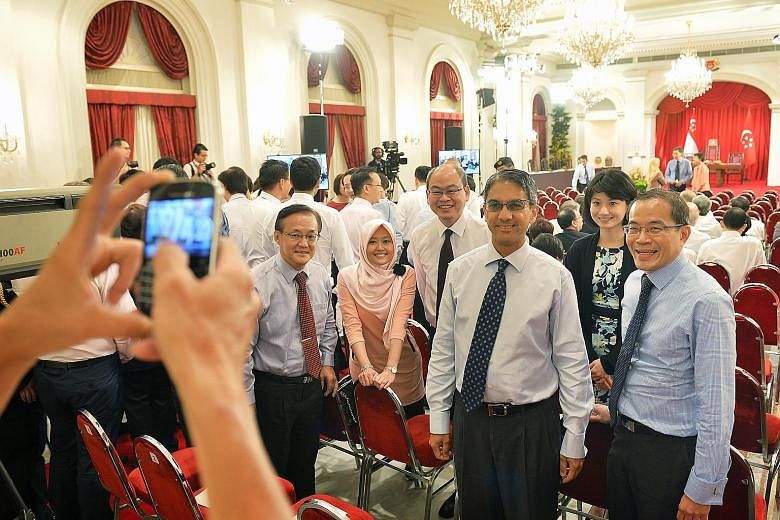It has been described as a "poisoned chalice", a "ploy" to keep people from voting for the opposition, and a "back door" for the opposition to get into Parliament.
The Non-Constituency MP (NCMP) scheme has become one of the most talked-about issues this election season, with vigorous debate from both sides of the political divide.
NCMP seats are offered to the opposition's "top losers", its candidates who garner the best results at the polls even though they do not win, and over the years the number of seats has increased from three to the 12 on offer in the coming election.
These 12 seats can comprise any combination of elected MPs or NCMPs. This means that if there are 12 or more elected opposition MPs, no NCMP seats will be allocated.
The ruling People's Action Party (PAP) argues that the scheme guarantees political diversity regardless of the outcome of the polls on July 10, while opposition parties have said that without their candidates winning outright at the ballot box, the PAP would have a "blank cheque" to do as it wishes.
The scheme became a talking point when Workers' Party (WP) chief Pritam Singh unveiled his party's manifesto and slogan "Make Your Vote Count" last Sunday and urged Singaporeans to vote for the WP, warning that there was a real risk of a wipeout of elected opposition MPs at the coming polls with the PAP winning all 93 seats.
The WP argued that the PAP's call for a strong mandate on July 10 amounted to it seeking a "blank cheque" on its actions. The PAP, it said, would have a strong mandate even if the opposition won a third of the 93 seats up for grabs.
This triggered a response from Prime Minister Lee Hsien Loong, who called the WP's suggestion of an opposition wipeout a "tactic" and said the PAP faced a hard fight for votes as Singaporeans were hurting from the impact of Covid-19.
PM Lee, who is the PAP's secretary-general, would later point to the NCMP scheme, saying that a "significant opposition presence" would be guaranteed in Parliament no matter what happens.
In 2016, the Constitution was amended to give NCMPs equivalent voting rights as elected MPs - these changes will take effect in the next term of government.
Pointing out their enhanced powers, PM Lee said at a virtual press conference after the start of campaigning: "They can vote on Budgets, they can vote on constitutional amendments, they can even vote on motions of confidence.
"So whatever happens, a significant opposition presence is guaranteed. There is no possibility of the opposition being shut out from Parliament."
Other ministers, including Ms Indranee Rajah and Mr Chan Chun Sing, have also made similar points over the past week.
A core pillar of the PAP's campaign in this general election is asking voters for a clear and strong mandate, so it can lead Singapore into the post-Covid-19 future.
With the election coming in the middle of a crisis and recession, observers have said the PAP could see voters flock to it for safety.
So the NCMP scheme has been touted as a fail-safe option that would ensure a minimum number of opposition members in Parliament.
It was introduced in 1984 out of a recognition that people wanted opposition voices in the country's legislative body.
OPPOSITION POSITION
Dr Tan Cheng Bock of the Progress Singapore Party (PSP) has said he would turn down an NCMP seat if offered one, although others from his party might take it up.
At a walkabout on Thursday, he called the scheme a "ploy" to dissuade people from voting for the opposition.
But the most vigorous opposition has come from the WP. Its Hougang SMC candidate Dennis Tan called the NCMP scheme a "poisoned chalice" and said it aimed to keep other parties from laying down roots in a constituency.
He pointed out that NCMPs do not have access to facilities in constituencies they contested in and are not allowed to hold events there.
"As a former NCMP, I appeal to all voters not to be deceived by PAP's intention for NCMPs when you go to the ballot box. Please elect sufficient opposition constituency MPs," he said during an online talk show by the WP on Wednesday.
While the PAP pointed to the argument that NCMPs have the same voting rights as elected MPs, WP candidate Leon Perera said their views carry less weight because they do not have the weight of their constituents behind them.
"A Parliament where the only opposition is NCMPs who have lost the election and do not have the full mandate of the people are MPs whose ideas can be ignored," he wrote on Facebook on Wednesday.
The WP's argument then is that elected opposition MPs are necessary to provide a check and balance in Parliament, with party new face Jamus Lim saying during a televised debate that the WP did not want to deny the PAP a mandate, but a "blank cheque".
The WP's position on the NCMP scheme is well known, with former WP chief Low Thia Khiang once describing these MPs as "duckweed on the water of a pond" because they lack political muscle and grassroots grounding.
But political scientist Bilveer Singh pointed out that despite the WP opposition, it has taken a pragmatic approach in accepting NCMP seats - noting for instance that party chairman Sylvia Lim was made an NCMP in 2006, which helped her cement her reputation as a serious and capable politician.
"The NCMP scheme has been a blessing for the opposition, in the sense that it has given their MPs a lot of exposure," he said.
But Singapore Management University law don Eugene Tan also said the PAP would be hard-pressed to convince voters that the views of an NCMP carry the same weight as an elected opposition MP.
Having said that, it is not an issue that will sway voters, when compared with the more pressing bread-and-butter concerns, he added.


